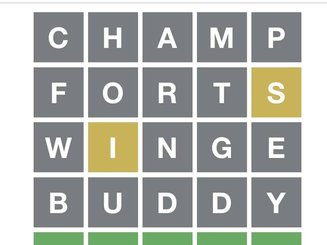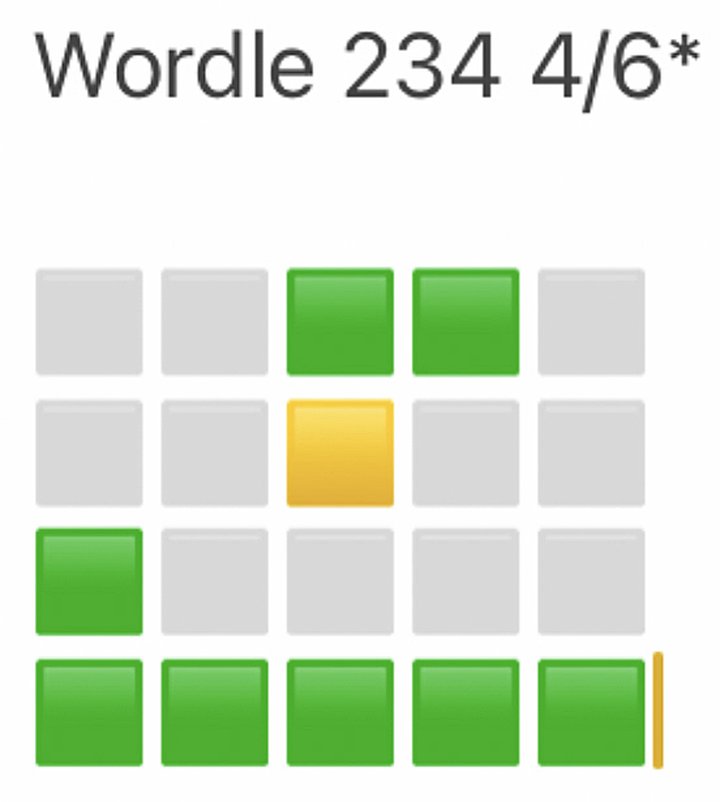“Llanddewi Rhydderch last received publicity for a curious reason when it emerged that the Pacific nation of Kiribati had an honorary consulate there.”
— From The Guardian, extolling the highlights of the Welsh village where Josh Wardle, inventor of Wordle, is from.
Along with the eternal questions that keep many of us awake at night — Will I die before Social Security goes broke? What’s the difference between a UFO and a UAP? Is J-Lo’s new movie autobiographical?—comes a new one out of left field, ready to become the debate of the age: Is my first guess four vowels (ADIEU, AUDIO…) or four consonants (CLAMP, GRIPS…)?
Me, I’m a consonant guy. Even if I knew all the vowels, I wouldn’t know what to do with them, they’re too mushy. Consonants, on the other hand, have bite and depth. I’ve been doing the New York Times daily crossword for so long that my heart rate goes up if I’m blessed with a K or (be still my heart) a Q. Or G as the last letter—usually a giveaway for an …ING ending. If all I see is something like A?E?OI?A?, I give up that area and look elsewhere for low-hanging fruit. OTOH, if I get, say, ?D?N??D?L I’m home free, the word practically speaks itself, albeit hoarsely.
In case you’ve been stuck in a cave or on Last Chance Grade for the last few months, Wordle is a nice new daily word game. (I’ve seen “nice attached to it so many times, it goes with the territory now.) Since being unleashed on the world last October, it’s taken off like a…virus? Its inventor, Josh Wardle, is Brooklyn-based Welsh software engineer who wanted to do something, well, nice, for his word-game-playing partner. Wordle is simple to play. You have six chances to guess a mystery five-letter word. With each guess, you get feedback: a gray letter means that letter isn’t in the target word; yellow means it’s in there (perhaps more than once), but not in the position you had; green says, this letter is correct and it’s correctly placed.

Here’s one reason Wordle is so addictive. After four unsuccessful guesses and with barely any information, I was able to deduce the correct word (hence the green tiles in the fifth row) from the remaining letters.
When I said, “unleashed on the world,” I wasn’t kidding. In the few months it’s been around, Wordle has been cloned into over 100 languages, along with such self-explanatory versions as Sweardle, Lewdle and Harry Potter-themed Wizarding Wordle. But what do you do when your language is, say Chinese Mandarin? No problem, apparently. Instead of five “English” letters, Li Zhong, a programmer from Hangzhou, adapted Wordle into chengyu characters. These are “a type of traditional Chinese idiomatic expression, most of which consist of four characters. Chengyu were widely used in Classical Chinese and are still common…today.” (Thanks Wikipedia.) Chengyu Wordle now has nearly 100,000 players.

Traditional chengyu meaning “Break the pots and sink the boats,” referencing the Battle of Julu, 207 BC, when Xiang Yu, after leading his army across the Yellow River, burned his boats to be sure every soldier was ready to die. He won.
The riddle is this: In an age when huge dot.coms are spending years and millions designing new games for online players, how come one guy with a budget of $100/month (for his server) can create a game that three million people worldwide play daily, all in the space of a few months? Some answers:
- It’s simple (it takes a minute to learn how to play)
- It’s free (even the New York Times, which recently bought the rights to publish Wordle for “a seven-figure sum,” offers it at no cost)
- Games are limited, since the “official” Wordle is once a day (although you can play more for practice here if you want)
- It’s just the right mix of easy vs. challenging. If it’s too easy for you, switch to “hard mode,” wherein all correct letters in a guess (yellow and green) must be used in your subsequent guesses
- It’s communal, in the sense that you can share your result, without spoilers, with your online pals thus:
Got it in four!
Here’s how to get started, at Josh Wardle’s orginal site.
It’s addictive…don’t say I didn’t warn you.

CLICK TO MANAGE